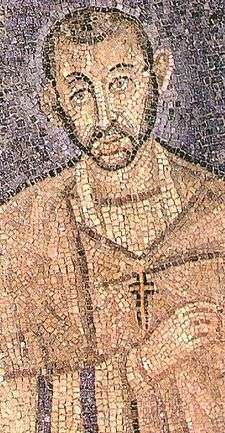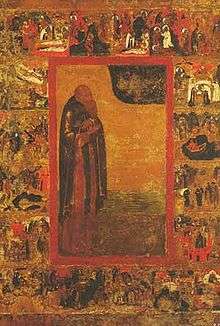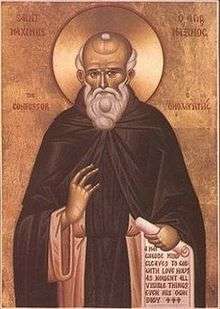December 7 (Eastern Orthodox liturgics)

The Eastern Orthodox cross
Dec 6 - Eastern Orthodox liturgical calendar - Dec 8
All fixed commemorations below celebrated on December 20 by Orthodox Churches on the Old Calendar.[note 1]
For December 7th, Orthodox Churches on the Old Calendar commemorate the Saints listed on November 24.
Saints
- Holy Apostle Tychicus (1st century)[1]
- Martyr Athenodorus of Mesopotamia (304)[2][note 2]
- Martyr Neophytus, by drowning.[4]
- Martyr Dometius, by the sword.[5]
- Martyrs Priscus, Martin, and Nicholas, near Blachernae.[6][7][8]
- Martyrs Isidore, Acepsimas, and Leo, by fire.[9]
- Martyrs Gaianos and Gaina, by fire.[10]
- Venerable Ammon, Bishop of Nitria (c. 350)[11][note 3] (see also October 4)[12]
- Saint Ambrose of Milan, Bishop (Ambrose of Mediolanum) (397)[13][14][note 4] [note 5]
- Holy Orthodox Woman Martyr, in Rome, by being burned alive, for refusing Arianism.[16]
- Holy Orthodox Martyrs burned in the Temple, in Carthage, by the Arians.[17]
- Holy 362 martyrs of Africa, martyred by the Arians:
- Saint Bassa of Jerusalem, Abbess (5th century)[21] (see also December 9 - (Greek Menaion))
- Saint Ignatius, monk, near Blachernae.[22]
- Saint Paul the Obedient, of Cyprus.[21][23][note 6]
- Venerable John the Faster, of St. Sabbas Monastery.[21]
Pre-Schism Western Saints
- Saint Urban of Teano (Urbanus), Bishop of Teano in Campania, Confessor (c. 356)[14][15]
- Saint Victor of Piacenza, first Bishop of Piacenza c. 322-375, defender of Orthodoxy against Arianism (375)[14]
- Saint Anianus (Agnan, Aignan), fifth Bishop of Chartres in France (5th century)[14]
- Saint Martin of Saujon, a disciple of St Martin of Tours, founded the monastery of Saujon (c. 400)[14][note 7]
- Saint Servus, a layman of noble birth, martyred under the Arian Vandal King Huneric (483)[14][note 8]
- Saint Buithe (Buite, Boethius), founder of Monasterboice in Ireland (521)[14][note 9]
- Saint Burgundofara (Fara), founder of Faremoutiers Abbey (657)[14][15][note 10]
- Saint Diuma, Bishop of the Mercians and Middle Anglians (7th century)[25][26][note 11]
Post-Schism Orthodox Saints
- Saint Philothea of Turnovo (Philothea of Thrace, the Protectress of Romania) (1060)[21][27][note 12]
- Saint John, faster of the Kiev Caves (12th century)[21][28][29]
- Righteous Gerasimos, Ascetic of Euboea, missionary of Greece in the period of the Frankokratia (c. 1320)[30]
- Venerable Gregory the Silent of Mount Athos, founder of Grigoriou, Mt. Athos (Gregory of Serbia) (1405)[21][31][note 13]
- Saint Nilus of Stolbnyi Island (Nilus, monk of Stolbensk Lake) (1544)[21][33]
- Saint Anthony, Abbot of Siya Monastery (Novgorod) (1556)[21][34]
New Martyrs and Confessors
- Hieromartyr Sergius Galkovsky (1917)[25][35]
- Hieromartyr Antonius Popov, Priest (1918)[25][26][35]
- Hieromartyr Andronic (1918)[25]
- Hiero-confessor Ambrose (Polyansky), Bishop of Kamenets-Podolsk (1932)[21][25][29]
- Hieromartyrs Sergius Goloshapov, Michael Uspensky and Sergius Uspensky, Priests (1937)[25][35]
- Hieromartyr Nikiphor Litvin, Deacon, and Hieromartyr Galaction Urbanowicz-Novikov (1937)[25][35]
- Martyr Joanna Demidova (1937)[25][35]
- Hieromartyrs Peter Krestov and Basil Mirozhin, Priests (1941)[25][35]
Other commemorations
- Consecration of the Church of the Theotokos in the district of the Curator, Constantinople ((Greek) τοῦ Κουράτορος) (5th century)[36][note 14][note 15]
- "Seligersk" (Vladimirsk) Icon of the Mother of God.[25][26][note 16]
- Repose of Abbot Gabriel of Valaam (1910)[21][note 17]
Icon Gallery
-
.jpg)
St. Ammon of Egypt (Menologion of Basil II, 10th century).
-

St. Ambrose of Milan.
-
St. Burgundofara, stained glass window.
-

St. Antony of Siya (17th-century icon).
Notes
- ↑ The notation Old Style or (OS) is sometimes used to indicate a date in the Julian Calendar (which is used by churches on the "Old Calendar").
The notation New Style or (NS), indicates a date in the Revised Julian calendar (which is used by churches on the "New Calendar"). - ↑ The Holy Martyr Athenodoros, from Syrian Mesopotamia, led a monastic life from the time of his youthful years. Reported on, he was arrested and condemned to fierce tortures by the governor of the land, Eleusios. Miracles accompanied the martyrdom of the saint, which brought many of the pagans there present to the Christian faith. When they decided to behead the saint with a sword, the executioner died, and his head separated from its shoulders. The saint gave up his spirit to God in prayer.[3]
- ↑ In some Menaia he is given as the Bishop of Nitria.
- ↑ Born in France, his father was prefect there. Before he was thirty-five, he was appointed governor of Liguria and Aemilia with his headquarters in Milan. The whole province was rent by the Arian controversy. When the Bishop of Milan died in 374, Ambrose, as governor, went to the Cathedral to ensure peace and order the new election. He himself, though still a catechumen, was elected by acclamation, after a child had been suddenly heard to cry out 'Ambrose for bishop'. Ambrose's objections were overruled and he was consecrated on Dec 7 374. He proved to be a Church Father. He excelled as an administrator, writer, protector of the poor and the 'hammer of Arianism'. He was outspoken in withstanding the tyranny of Emperors. His courage in reproving Theodosius the Great was a fine example of Orthodoxy. He reposed on Great Friday, April 4 397.[14]
- ↑ "AT Milan, the consecration of St. Ambrose, bishop and doctor of the Church, who has ennobled the universal Church by his holiness and teaching."[15]
- ↑ The Monk Paul the Obedient – when he lived is unknown. There is only a short life which says that he was the son of well-off parents. He left secular life upon reaching maturity. The appellation "Obedient" was bestowed upon the monk for the deep humility peculiar to him and for the complete renunciation of his own will. One time the monk moved by hand boiling resin-pitch, and received not the slightest burn from it. Some of the brethren regarded him as a God-bearing ascetic, but others became suspicious of him. Through prayers the monks received a unique vision proving that their brother – was a true ascetic. By night they were all transported off to paradise and they conversed with the Monk Paul, who permitted them to take with them for the memory a flower or twig. Awakening from sleep, they detected in their hands the flowers and twigs from paradise. After this Blessed Paul set off to Jerusalem, and then to Cyprus. Having led a solitary life, he expired to God on Mount Paregoros [Mount Solace]. Before his death the voice of God said to him: "Ascend the mountain, Paul, and accept the end of life".[24]
- ↑ "At Saintes, in France, St. Martin, abbot, at whose tomb God works frequent miracles."[15]
- ↑ "At Tuburbum, in Africa, during the persecution of the Vandals, under the Arian king Hunneric, St. Servus, martyr, who, being for a very long time beaten with rods, lifted up on high with pulleys and suddenly dropped on flint-stones with his whole weight, and rubbed over with sharp stones, obtained the palm of martyrdom."[15]
- ↑ After some years in Italy and elsewhere, he returned to Scotland and helped enlighten the Picts. Carbuddo is named after him.
- ↑ Blessed by St Columbanus as a child, she became a nun despite her father's opposition, and so began the convent of Brige in France. This was later called Faremoutiers, i.e. Fara's Monastery, where she was abbess for thirty-seven years.
- ↑ Born in Ireland, he helped convert Mercia in England as a missionary and bishop.
- ↑ Her relics are in Arges, Romania.
- ↑ The Monk Gregory, born in Serbia, pursued asceticism on Athos. The monastery formed by him, and dedicated by him to Saint Nicholas, was termed in his honour the Gregoryite. In the Athos record-acts was discovered the signature of the monk from about 1405. By tradition, the relics of Saint Gregory were taken from Athos by Serbian monks.[32]
- ↑ This is mentioned in Patmos Codex 266.
- ↑ A small Byzantine building, now used for Moslem worship under the name of Balaban Aga Mesjedi, is situated in the quarter of Shahzadé, in Istanbul; off the south side of the street leading to the mosque of Sultan Mehemed and the gate Edirne Kapoussi. A.J. Mordtmann proposes to identify it with the church of the Theotokos in the district of the Curator (τοῦ Κουράτορος), the foundation of which is ascribed to Verina, the consort of Leo Macellus (457-474).
- ↑ The Icon of the Mother of God of Seligersk-Vladimir was brought in the 16th century by the Monk Nil of Stolobensk (commemorated 7 December and 27 May) to the island of Seliger, where the saint pursued asceticism and founded a monastic hermitage. The celebration for the Wonderworking Icon of the Mother of God is also on 7 December.[37]
- ↑ Abbot Gabriel (1848-1910). When he was 18 years old [his future Abbot of Valaam came to Abbot Damascene, who sternly said that "if one comes to a monastery and says he wants to be a monk, that means serious business—there should be no change until death!" And the youth made a vow right then, which he kept for the rest of his life. At a relatively young age he lived in the severest Skete of St. John the Baptist, with the great ascetic and hermit, John the Blind. This experience later enabled him to promote anchoretism. Eventually he became abbot of Valaam. After 37 years there, he was transferred to the beautiful Alatyr Monastery along the Volga River, that was in need of restoration. Having done much for its betterment, he died a sudden but peaceful death seven years after he left Valaam.[38]
References
- ↑ Great Synaxaristes: (Greek) Ὁ Ἅγιος Τυχικὸς ὁ Ἀπόστολος. 7 Δεκεμβρίου. ΜΕΓΑΣ ΣΥΝΑΞΑΡΙΣΤΗΣ.
- ↑ Great Synaxaristes: (Greek) Ὁ Ἅγιος Ἀθηνόδωρος ὁ Μάρτυρας. 7 Δεκεμβρίου. ΜΕΓΑΣ ΣΥΝΑΞΑΡΙΣΤΗΣ.
- ↑ The Holy Martyr Athenodoros. HOLY TRINITY RUSSIAN ORTHODOX CHURCH (A parish of the Patriarchate of Moscow).
- ↑ Great Synaxaristes: (Greek) Ὁ Ἅγιος Νεόφυτος ὁ Μάρτυρας. 7 Δεκεμβρίου. ΜΕΓΑΣ ΣΥΝΑΞΑΡΙΣΤΗΣ.
- ↑ Great Synaxaristes: (Greek) Ὁ Ἅγιος Δομέτιος ὁ Μάρτυρας. 7 Δεκεμβρίου. ΜΕΓΑΣ ΣΥΝΑΞΑΡΙΣΤΗΣ.
- ↑ Great Synaxaristes: (Greek) Ὁ Ἅγιος Πρῖσκος ὁ Μάρτυρας. 7 Δεκεμβρίου. ΜΕΓΑΣ ΣΥΝΑΞΑΡΙΣΤΗΣ.
- ↑ Great Synaxaristes: (Greek) Ὁ Ἅγιος Μαρτῖνος ὁ Μάρτυρας. 7 Δεκεμβρίου. ΜΕΓΑΣ ΣΥΝΑΞΑΡΙΣΤΗΣ.
- ↑ Great Synaxaristes: (Greek) Ὁ Ἅγιος Νικόλαος ὁ Μάρτυρας. 7 Δεκεμβρίου. ΜΕΓΑΣ ΣΥΝΑΞΑΡΙΣΤΗΣ.
- ↑ Great Synaxaristes: (Greek) Οἱ Ἅγιοι Ἰσίδωρος, Ἀκεψιμᾶς καὶ Λέων οἱ Μάρτυρες. 7 Δεκεμβρίου. ΜΕΓΑΣ ΣΥΝΑΞΑΡΙΣΤΗΣ.
- ↑ Great Synaxaristes: (Greek) Οἱ Ἅγιοι Γάϊος καὶ Γαϊανὸς οἱ Μάρτυρες. 7 Δεκεμβρίου. ΜΕΓΑΣ ΣΥΝΑΞΑΡΙΣΤΗΣ.
- ↑ Great Synaxaristes: (Greek) Ὁ Ὅσιος Ἀμμοῦν «ὁ τῆς Νιτρίας». 7 Δεκεμβρίου. ΜΕΓΑΣ ΣΥΝΑΞΑΡΙΣΤΗΣ.
- ↑ Great Synaxaristes: (Greek) Ὁ Ὅσιος Ἀμμοῦν ὁ Αἰγύπτιος. 4 Οκτωβρίου. ΜΕΓΑΣ ΣΥΝΑΞΑΡΙΣΤΗΣ.
- ↑ Great Synaxaristes: (Greek) Ὁ Ἅγιος Ἀμβρόσιος Ἐπίσκοπος Μεδιολάνων. 7 Δεκεμβρίου. ΜΕΓΑΣ ΣΥΝΑΞΑΡΙΣΤΗΣ.
- 1 2 3 4 5 6 7 8 9 December 7. Latin Saints of the Orthodox Patriarchate of Rome.
- 1 2 3 4 5 The Roman Martyrology. Transl. by the Archbishop of Baltimore. Last Edition, According to the Copy Printed at Rome in 1914. Revised Edition, with the Imprimatur of His Eminence Cardinal Gibbons. Baltimore: John Murphy Company, 1916. pp. 376-377.
- ↑ Great Synaxaristes: (Greek) Ἡ Ἁγία Ὀρθόδοξη Γυναίκα ἡ Μάρτυς. 7 Δεκεμβρίου. ΜΕΓΑΣ ΣΥΝΑΞΑΡΙΣΤΗΣ.
- ↑ Great Synaxaristes: (Greek) Οἱ Ἅγιοι Ὀρθόδοξοι Μάρτυρες ποὺ κάηκαν μέσα σὲ Ναό. 7 Δεκεμβρίου. ΜΕΓΑΣ ΣΥΝΑΞΑΡΙΣΤΗΣ.
- ↑ Great Synaxaristes: (Greek) Οἱ Ἅγιοι 300 Μάρτυρες ποὺ μαρτύρησαν στὴν Ἀφρικὴ. 7 Δεκεμβρίου. ΜΕΓΑΣ ΣΥΝΑΞΑΡΙΣΤΗΣ.
- ↑ Great Synaxaristes: (Greek) Οἱ Ἅγιοι 60 Μάρτυρες ἱερεῖς. 7 Δεκεμβρίου. ΜΕΓΑΣ ΣΥΝΑΞΑΡΙΣΤΗΣ.
- ↑ Great Synaxaristes: (Greek) Οἱ Ἅγιοι δύο Μάρτυρες ἱερεῖς. 7 Δεκεμβρίου. ΜΕΓΑΣ ΣΥΝΑΞΑΡΙΣΤΗΣ.
- 1 2 3 4 5 6 7 8 9 10 December 7/20. Orthodox Calendar (PRAVOSLAVIE.RU).
- ↑ Great Synaxaristes: (Greek) Ὁ Ὅσιος Ἰγνάτιος. 7 Δεκεμβρίου. ΜΕΓΑΣ ΣΥΝΑΞΑΡΙΣΤΗΣ.
- ↑ Great Synaxaristes: (Greek) Ὁ Ὅσιος Παῦλος ὁ Ὑποτακτικὸς. 7 Δεκεμβρίου. ΜΕΓΑΣ ΣΥΝΑΞΑΡΙΣΤΗΣ.
- ↑ The Monk Paul the Obedient. HOLY TRINITY RUSSIAN ORTHODOX CHURCH (A parish of the Patriarchate of Moscow).
- 1 2 3 4 5 6 7 8 9 10 December 20 / December 7. HOLY TRINITY RUSSIAN ORTHODOX CHURCH (A parish of the Patriarchate of Moscow).
- 1 2 3 The Autonomous Orthodox Metropolia of Western Europe and the Americas (ROCOR). St. Hilarion Calendar of Saints for the year of our Lord 2004. St. Hilarion Press (Austin, TX). p.91.
- ↑ St Philothea of Thrace, the Protectress of Romania. OCA - Feasts and Saints.
- ↑ Great Synaxaristes: (Greek) Ὁ Ὅσιος Ἰωάννης ὁ Νηστευτὴς ὁ ἐν τῷ Σπηλαίῳ (Ρῶσος). 7 Δεκεμβρίου. ΜΕΓΑΣ ΣΥΝΑΞΑΡΙΣΤΗΣ.
- 1 2 Dr. Alexander Roman. December. Calendar of Ukrainian Orthodox Saints (Ukrainian Orthodoxy - Українське Православ'я).
- ↑ Great Synaxaristes: (Greek) Ὁ Ὅσιος Γεράσιμος ὁ ἐξ Εὐρίπου (Εὐβοίας). 7 Δεκεμβρίου. ΜΕΓΑΣ ΣΥΝΑΞΑΡΙΣΤΗΣ.
- ↑ Great Synaxaristes: (Greek) Ὁ Ὅσιος Γρηγόριος ὁ Ἡσυχαστὴς. 7 Δεκεμβρίου. ΜΕΓΑΣ ΣΥΝΑΞΑΡΙΣΤΗΣ.
- ↑ The Monk Gregory. HOLY TRINITY RUSSIAN ORTHODOX CHURCH (A parish of the Patriarchate of Moscow).
- ↑ The Monk Nil of Stolobensk. HOLY TRINITY RUSSIAN ORTHODOX CHURCH (A parish of the Patriarchate of Moscow).
- ↑ The Monk Antonii of Siisk. HOLY TRINITY RUSSIAN ORTHODOX CHURCH (A parish of the Patriarchate of Moscow).
- 1 2 3 4 5 6 (Russian) 7 декабря (ст.ст.) 20 декабря 2013 (нов. ст.). Русская Православная Церковь Отдел внешних церковных связей. (DECR).
- ↑ Great Synaxaristes: (Greek) Ἐγκαίνια Ναοῦ Ὑπεραγίας Θεοτόκου ἐν τοῖς Κουράτορος. 7 Δεκεμβρίου. ΜΕΓΑΣ ΣΥΝΑΞΑΡΙΣΤΗΣ.
- ↑ The Icon of the Mother of God of Seligersk-Vladimir. HOLY TRINITY RUSSIAN ORTHODOX CHURCH (A parish of the Patriarchate of Moscow).
- ↑ VALAAM PATERICON.
Sources
- December 7/20. Orthodox Calendar (PRAVOSLAVIE.RU).
- December 20 / December 7. HOLY TRINITY RUSSIAN ORTHODOX CHURCH (A parish of the Patriarchate of Moscow).
- Complete List of Saints. Protection of the Mother of God Church (POMOG).
- December 7. OCA - The Lives of the Saints.
- Dr. Alexander Roman. December. Calendar of Ukrainian Orthodox Saints (Ukrainian Orthodoxy - Українське Православ'я).
- December 7. Latin Saints of the Orthodox Patriarchate of Rome.
- The Roman Martyrology. Transl. by the Archbishop of Baltimore. Last Edition, According to the Copy Printed at Rome in 1914. Revised Edition, with the Imprimatur of His Eminence Cardinal Gibbons. Baltimore: John Murphy Company, 1916. pp. 376-377.
- Rev. Richard Stanton. A Menology of England and Wales, or, Brief Memorials of the Ancient British and English Saints Arranged According to the Calendar, Together with the Martyrs of the 16th and 17th Centuries. London: Burns & Oates, 1892. p. 587-588.
Greek Sources
- Great Synaxaristes: (Greek) 7 ΔΕΚΕΜΒΡΙΟΥ. ΜΕΓΑΣ ΣΥΝΑΞΑΡΙΣΤΗΣ.
- (Greek) Συναξαριστής. 7 Δεκεμβρίου. ECCLESIA.GR. (H ΕΚΚΛΗΣΙΑ ΤΗΣ ΕΛΛΑΔΟΣ).
Russian Sources
- (Russian) 20 декабря (7 декабря). Православная Энциклопедия под редакцией Патриарха Московского и всея Руси Кирилла (электронная версия). (Orthodox Encyclopedia - Pravenc.ru).
- (Russian) 7 декабря (ст.ст.) 20 декабря 2013 (нов. ст.). Русская Православная Церковь Отдел внешних церковных связей. (DECR).
This article is issued from Wikipedia - version of the 8/19/2016. The text is available under the Creative Commons Attribution/Share Alike but additional terms may apply for the media files.
